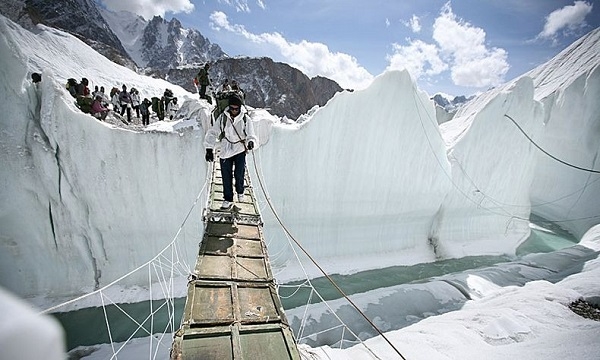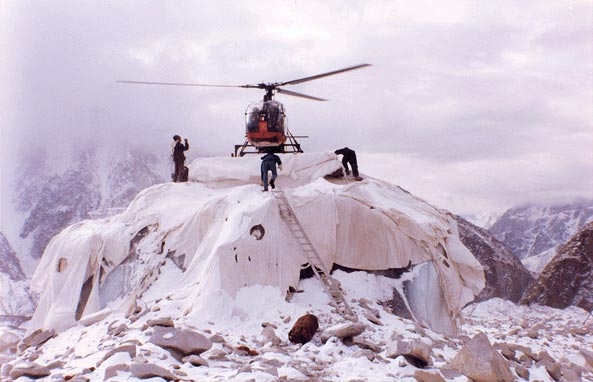Unsung Heroes of Siachen Glacier
Total Views | 76
-Major General Mrinal Suman
According to Indian scriptures, all areas above the tree line are unfit for human living. They are ascended by humans at the end of their ‘van-prasth’ stage to seek salvation, as was done by the Pandavas. Such a premise is also supported scientifically. Lack of flora and fauna, coupled with acute shortage of oxygen and excessive intensity of ultra-violet rays make areas above tree line highly unsuitable for habitation.
Leaving aside snow and boulders, there are no local resources available. Every single item for sustenance has to be brought in at enormous effort. Peculiarities of the challenges faced can be gauged from the fact that disposal of human excreta has been defying all solutions – chemical, biological and physical. Due to extremely low temperatures, it just does not decompose and remains unchanged for ever, posing major hygiene problems.
Siachen Glacier at a height of over 18,000 feet is the world’s highest battle field. Enormity of effort required for living and fighting at that altitude can be judged from the fact that the highest mountain in Alps is Mont Blanc at 15,774 ft and climbers carry oxygen with them. Ironically, Siachen means 'places of the wild roses' in local lore. In addition to the hostile activities of the enemy, soldiers endure treacherous environment - avalanches, snow storms and crevasses make for a deadly combination. Frost bites result in loss of limbs in numerous cases. Thousands of soldiers have perished due to pulmonary oedema and other high altitude diseases while defending this inhospitable terrain. As Western countries do not face such an environment, very little medical research has been carried out in the world as regards long and short term effects of high altitude areas. In case a man is taken directly from plains to Siachen, he is unlikely to survive. His lungs will fail to trap enough air to get required supply of oxygen and he will, in all probability, succumb to accumulation of fluids in his lungs. Therefore, soldiers have to undergo elaborate acclimatization programme before induction, spanning over 4 weeks and even more.

Snowstorms last for weeks and temperatures dip down to minus 60 degrees centigrade. Helicopters, the sole means of quick de-induction, become inoperative and the area remains cut-off for prolonged periods. Construction and maintenance of helipads is a huge challenge. If constructed in summers, they get buried under heavy winter snow. On the other hand, in case they are prepared in winters, snow around them melts in summers and they get perched on tall snow pillars.
Psychological Effects
One thing is certain that no human can ever remain unaffected by a tenure on the glacier. Oxygen-deprivation, exposure to ultra-violet rays, prolonged isolation and constant threat to life have varied effects on soldiers. Severe psychological pressures change their personality, thinking and approach to life. Response depends on individual threshold of tolerance and coping mechanism. In some cases body’s defence mechanism is unable to withstand stress and reaches breaking point. Normal functioning is replaced by erratic demeanor.
Many soldiers suffer from acute psychosomatic and mental duress. Frequent loss of lives and fatal injuries show them frailty of human life, driving them to become highly philosophical – trying to decipher ultimate purpose of life. They start relating to God and his omnipresence. They become overly religious and seek solace in prayers. There have been cases where soldiers have sought pre-mature retirement after completing glacier tenure to join some ashram in search of peace of mind - their personality having undergone complete transformation.
Such an environment also makes many soldiers excessively god fearing, bordering on becoming superstitious. Most stop drinking liquor and eating meat, some for personal fulfillment and some to placate gods. Some soldiers tend to assign usual natural occurrences to supernatural phenomena. Hallucinations blur the difference between fact and imagination.
Though not proved medically, there is a general apprehension in the minds of troops that prolonged exposure to ultra-violet rays in oxygen-starved environment makes men impotent. Despite repeated reassurances to the contrary by commanders and doctors, this fear stays with almost all soldiers. It has been a major cause of concern for the organisation.
Behavioural Changes
Soldiers by nature are very emotional. Every letter received from home means excitement and instant morale boost, more so if it contains photographs of wife and children. But lack of oxygen on the glacier has a strange effect on normal mental orientation of some soldiers. They display a distinct indifference to normal human emotions. Some soldiers have been seen carrying unopened letters in their pockets for days, showing a distinct lack of enthusiasm to read them.
In a few cases, sense of isolation results in a feeling of being overwhelmed, forcing soldiers to withdraw into their shells. Some go into depression. At times, indecisiveness, pessimism and inability to concentrate result in cognitive impairment and memory problems. Anxiety, tension and restlessness cause mood swings and short tempers.
Due to rarefied atmosphere, soldiers lose appetite and avoid eating meals, resulting in debilitation which further reduces urge to eat. They thus get trapped in a vicious cycle. The Government has tried to provide attractive food items like dry fruits and chocolates but with little effect. Soldiers have been seen to throw food away rather than eat it.

Challenges of Command
Command of troops in such environment is an extreme test of leadership traits. In addition to managing troops, commanders have to ensure that their own temperament and deportment remain unaffected. Irrational and erratic behaviour by a commander is a sure recipe for the breakdown of normal functioning of a military unit. Therefore, it is essential that they be trained to read signs of their own inconsistent behaviour to be able to exercise caution. It is only then that they can monitor mental and physical health of their troops.
The problem of isolation in the case of officers is far more acute as almost all posts are manned by a solitary officer with his men. He has no one around to share his feelings and thoughts. Therefore, every officer in the glacier has to be physically and mentally robust.
Commanders have to be on the look out for possible behavioural changes amongst troops and handle them with empathy. They should be able to identify symptoms of extreme duress and take timely curative action. Instead of commanding troops through issuance of orders, they have to modify their style of leadership. Less authoritarian approach and display of compassion invariably prove more effective. Most officers assume the mantle of being a father figure to their troops. They make them eat their meals sitting in front of them. Periodic ‘letter parades’ are held where all troops are ordered to write letters to their homes conveying their welfare. Soldiers are engaged in informal conversation and encouraged subtly to share their concerns.
The Brave Hearts with Never-Say-Die Spirit
The very fact that during the last three decades of Indian Army’s deployment on Siachen Glacier, there has not been a single incident of transgression bears testimony to the mental and physical robustness of Indian soldiers and the high quality of leadership. To date, no Indian soldier has ever sought exemption from serving on the glacier. It is considered a cowardly and ‘unsoldierlike’ act. On the contrary, many officers and men hide their medical infirmities lest they be prevented from being with their units on the glacier. Group cohesion and peer support sustain soldiers on the glacier. Their light hearted banter and sense of humour enliven their stay.
There are numerous acts of individual and collective heroism every day – risking own lives to rescue colleagues trapped in hazardous snow avalanches or to save a soldier lying crippled at the base of a deep crevasse. A soldier offered to jump down from a hovering helicopter at a post located at 20,000 feet altitude to prepare a makeshift helipad with shovel to help evacuate a casualty. Army helicopter pilots have been flouting all norms of flight safety while volunteering to fly out seriously sick soldiers in sub-optimal and perilous flying conditions.
Finally, one is reminded of the famous counsel of Kautilya to Chandragupta, “Pataliputra reposes each night in peaceful comfort secure in the belief that the distant borders of Magadha are inviolate, thanks only to the Mauryan Army standing vigil with naked swords and eyes peeled for action, day and night, in weather fair and foul, all eight praharas (round the clock), quite unmindful of personal discomfort and hardship, all through the year, year after year. While the citizenry of the State contributes to see that the State prospers and flourishes, the soldier guarantees it continues to exist as a State.”
Our Unsung Heroes of Siachen Glacier defy nature to stand vigil in the most inhospitable environs of the glacier to guard national frontiers. They brave extreme physical and mental privations so that India remains secure and their countrymen can sleep in peace. They do deserve nation’s recognition and support.
Bharati Web







